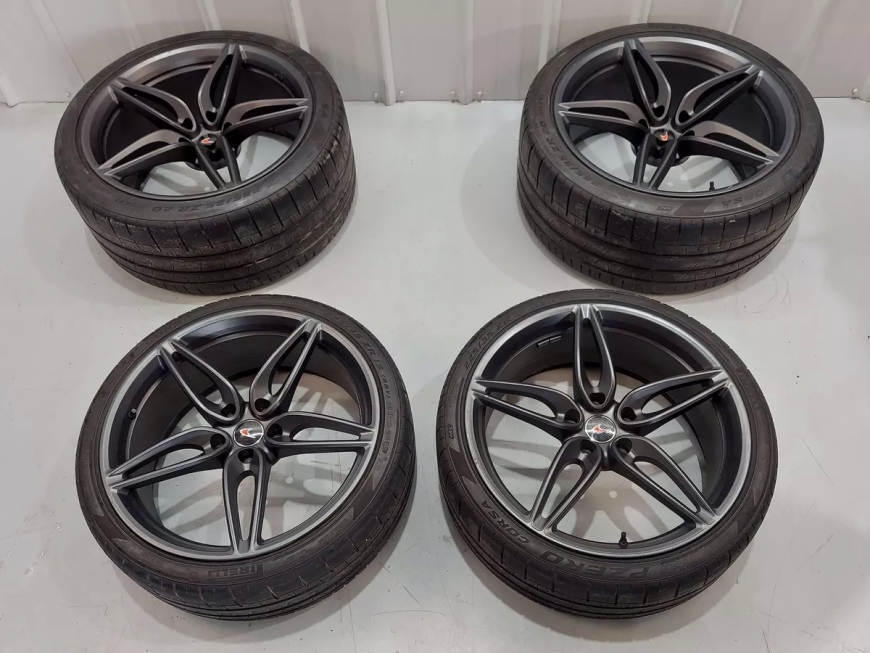The Evolution and Benefits of Lightweight Alloy Wheels

In the world of automotive advancements, the development of lightweight alloy wheels stands as a significant milestone. These wheels, crafted from materials such as aluminum or magnesium, offer numerous benefits over traditional steel wheels. Their evolution is not just a testament to technological progress but also a response to the growing demand for better performance, fuel efficiency, and aesthetics in vehicles.
Historical Perspective: From Steel to Alloys
The transition from steel to lightweight alloy wheels began in the late 1960s. Early vehicles were equipped with steel wheels, which were durable but heavy. The automotive industry soon realized that the weight of the wheels had a significant impact on vehicle performance and fuel efficiency. This led to the exploration of alternative materials, and alloy wheels emerged as a superior option. Lightweight alloy wheels quickly gained popularity, especially in high-performance and luxury vehicles, due to their numerous advantages.
Material Composition and Manufacturing
Lightweight alloy wheels are primarily made from aluminum, magnesium, or a combination of both. Aluminum alloys are the most common due to their balance of strength, weight, and cost-effectiveness. Magnesium alloys, although lighter, are more expensive and less commonly used. The manufacturing process of alloy wheels involves casting, forging, or a combination of both. Casting is a process where molten metal is poured into a mold, while forging involves shaping the metal under high pressure. Forged wheels are typically stronger and lighter than cast wheels but come at a higher cost.
Advantages of Lightweight Alloy Wheels
-
Improved Performance: The reduced weight of alloy wheels leads to better acceleration, braking, and handling. This is because less weight needs to be moved, resulting in quicker response times and more agile driving dynamics.
-
Enhanced Fuel Efficiency: Lighter wheels reduce the overall weight of the vehicle, leading to lower rolling resistance and improved fuel efficiency. This is particularly important in today’s automotive market, where fuel economy is a key selling point.
-
Better Heat Dissipation: Alloy wheels dissipate heat more effectively than steel wheels, reducing the risk of brake fade during intense driving conditions. This makes them a popular choice for performance-oriented vehicles.
-
Aesthetic Appeal: Alloy wheels offer greater design flexibility, allowing for more intricate and attractive wheel designs. This enhances the visual appeal of the vehicle and can be a significant factor for buyers looking for a stylish ride.
-
Corrosion Resistance: Unlike steel wheels, alloy wheels are more resistant to rust and corrosion. This increases their lifespan and reduces maintenance costs, providing long-term benefits to vehicle owners.
Technological Innovations in Alloy Wheels
The development of lightweight alloy wheels has seen numerous technological advancements. Modern alloy wheels are often treated with protective coatings to enhance their durability and resistance to environmental factors. Additionally, advanced manufacturing techniques, such as flow forming, have been introduced. Flow forming is a process that combines casting and forging, resulting in wheels that are both lightweight and strong. These innovations continue to push the boundaries of what alloy wheels can achieve, making them an essential component in modern automotive design.
Environmental Impact and Sustainability
The production and use of lightweight alloy wheels have positive implications for the environment. The reduction in vehicle weight leads to lower fuel consumption and, consequently, reduced greenhouse gas emissions. Furthermore, many manufacturers are now focusing on sustainable practices, such as using recycled materials and reducing energy consumption during the manufacturing process. This aligns with the broader automotive industry’s efforts to minimize its environmental footprint and move towards more sustainable solutions.
Market Trends and Consumer Preferences
Consumer demand for lightweight alloy wheels has grown significantly over the years. This is driven by a combination of factors, including the desire for better vehicle performance, fuel efficiency, and aesthetic appeal. The aftermarket industry for alloy wheels is also thriving, with many vehicle owners opting to upgrade their standard wheels to alloys for improved looks and performance. This trend is particularly evident in the sports and luxury car segments, where alloy wheels are often seen as a must-have feature.
Challenges and Considerations
Despite their many advantages, lightweight alloy wheels also come with certain challenges. They are generally more expensive than steel wheels, which can be a deterrent for some buyers. Additionally, while they are resistant to corrosion, they can be more susceptible to cosmetic damage such as scratches and dents. Proper maintenance and care are essential to preserve the appearance and performance of alloy wheels. Consumers should also be aware of the potential for counterfeit alloy wheels, which can be of inferior quality and pose safety risks.
Future Prospects of Lightweight Alloy Wheels
The future of lightweight alloy wheels looks promising, with continuous advancements in materials and manufacturing processes. Research and development are focused on creating even lighter and stronger alloys, which will further enhance vehicle performance and efficiency. Innovations such as carbon fiber-reinforced wheels are also on the horizon, offering the potential for ultra-lightweight and highly durable wheels. As the automotive industry moves towards electric and autonomous vehicles, the demand for lightweight components, including alloy wheels, is expected to increase.
Conclusion: A Pivotal Automotive Innovation
In summary, deep dish chrome rims represent a pivotal innovation in the automotive industry. They offer a range of benefits, from improved performance and fuel efficiency to enhanced aesthetics and environmental sustainability. Despite some challenges, their advantages make them a popular choice among consumers and manufacturers alike. As technology continues to evolve, lightweight alloy wheels are set to play an increasingly important role in shaping the future of automotive design and performance.
What's Your Reaction?

















